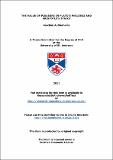Files in this item
The value of pleasure in Plato's Philebus and Aristotle's Ethics
Item metadata
| dc.contributor.advisor | Broadie, Sarah | |
| dc.contributor.author | Aufderheide, Joachim | |
| dc.coverage.spatial | 217 | en_US |
| dc.date.accessioned | 2011-12-12T14:49:33Z | |
| dc.date.available | 2011-12-12T14:49:33Z | |
| dc.date.issued | 2011-11-28 | |
| dc.identifier.uri | https://hdl.handle.net/10023/2105 | |
| dc.description.abstract | This thesis is a study of the theories of pleasure as proposed in Plato’s Philebus, Aristotle’s EN VII.11-14 and EN X.1-5, with particular emphasis on the value of pleasure. Focusing on the Philebus in Chapters 1 and 2, I argue that the account of pleasure as restorative process of a harmonious state in the soul is in tension with Plato’s claim that some pleasures are good in their own right. I show that there are in fact two ways in which pleasure (and other processes of the soul) can have value in the Philebus. The tension in Plato’s position arises because he focuses exclusively on only one way in which pleasure can have value. Chapter 3 deals with Aristotle’s response to Plato in EN VII.11-14. According to the standard interpretation only complete activities (such as thinking and seeing) can be pleasures in their own right, but not incomplete activities (such as eating and drinking). Since this interpretation attributes to Aristotle both an implausible view and a bad response to Plato, I offer a novel interpretation of EN VII.12 according to which the central contrast is not between complete and incomplete activities, but between states and their use. This interpretation is more faithful to Aristotle’s text and gives him a better response to Plato. In Chapter 4 I turn to the central claim of EN X.4-5 that pleasure perfects an activity. I argue that we cannot understand how pleasure functions unless we take into account the state whose activation is perfected by pleasure. In particular, the agent’s disposition of being a lover of a certain activity (an attitude which belongs to the activated state) is crucial for explaining why the agent takes pleasure in it. The focus on the agent’s attitude highlights that the value of pleasure does not depend solely on the value of the activity (as many interpreters assume). I suggest instead that pleasure is valuable when and because it is an appropriate response to a given situation. | en_US |
| dc.language.iso | en | en_US |
| dc.publisher | University of St Andrews | |
| dc.rights | Creative Commons Attribution-NonCommercial-NoDerivs 3.0 Unported | |
| dc.rights.uri | http://creativecommons.org/licenses/by-nc-nd/3.0/ | |
| dc.subject | Pleasure | en_US |
| dc.subject | Value | en_US |
| dc.subject | Hedonism | en_US |
| dc.subject | Aristotle | en_US |
| dc.subject | Plato | en_US |
| dc.subject | Philebus | en_US |
| dc.subject.lcc | BJ1481.A8 | |
| dc.subject.lcsh | Pleasure | en_US |
| dc.subject.lcsh | Plato. Philebus | |
| dc.subject.lcsh | Aristotle. Ethica Nicomachea | |
| dc.title | The value of pleasure in Plato's Philebus and Aristotle's Ethics | en_US |
| dc.type | Thesis | en_US |
| dc.contributor.sponsor | Arts and Humanities Research Council (AHRC) | en_US |
| dc.contributor.sponsor | Jacobsen Fellowship | en_US |
| dc.contributor.sponsor | University of St Andrews. School of Philosophical, Anthropological and Film Studies | en_US |
| dc.type.qualificationlevel | Doctoral | en_US |
| dc.type.qualificationname | PhD Doctor of Philosophy | en_US |
| dc.publisher.institution | The University of St Andrews | en_US |
This item appears in the following Collection(s)
Except where otherwise noted within the work, this item's licence for re-use is described as Creative Commons Attribution-NonCommercial-NoDerivs 3.0 Unported
Items in the St Andrews Research Repository are protected by copyright, with all rights reserved, unless otherwise indicated.


